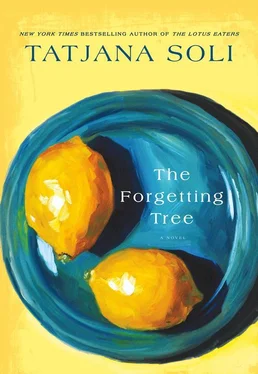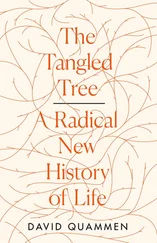Claire emptied Josh’s room, packing all his belongings in boxes, storing them in the barn, intending to move Lucy into the room so the endless bickering over a shared room would end. Then she changed her mind and moved all his things back in, frantic when she didn’t remember the precise place of each object, consulting the girls, who fought over their conflicting memories of the placement of a pencil cup, a baseball mitt.
* * *
The overdue harvest was quickly picked and sent out. A curious by-product of the Baumsargs’ tragedy, the fruit stand was overrun with people, and for the first time they sold out by noon each day. In a macabre act of souvenir-collecting, people coveted the cardboard boxes stamped with their name. Because they had lost so much time, they recovered substantially less fruit than they hoped. The defeat went unnoticed by Claire.
Not once did she go out and supervise the harvest. It was as if the trees and ground that she had loved had betrayed her. There was also a further isolation: Octavio no longer came into the house. Paz invited the girls over, but Claire told Gwen to turn down the offer. She didn’t want them out of her sight.
“We can’t turn into prisoners here,” Forster said.
Since the funeral he had let her do things as she saw fit, but her behavior was finally wearing on him. He allowed that her sorrow was making her act out. The unspoken accusation was that he had not been there to protect them. But still, she was turning paranoid in her grief.
Claire looked up from the apple she was peeling. “Maybe it’s time for us to move on.”
* * *
She canceled the Saturday teas, no longer wanting to bring the community onto the ranch. From then on, contact with the outside world would be held to a minimum. She took over the tasks of caring for the girls from Raisi. Together as one unit, she and the girls moved from breakfast room to living room to bedroom and back. Hardly during the day did one of them separate from the others, and when they did for any length, Claire grew panicky. They were not allowed to work at the fruit stand; they were not allowed to go outside, period, unless in a group, moving together like a small, wary army.
* * *
After a few weeks of living under siege, Raisi packed her bags to leave. “It’s time you were on your own again.”
“But I need you here.”
“What you need is to heal those girls.”
“They’re never out of my sight.”
“Do you see? They’re becoming afraid of life.”
Claire shifted in her seat. “The world is a bad place.”
“Good and bad. You can’t protect them forever.”
Without Raisi, Claire stayed up nights in her rocking chair in the girls’ room, waiting for the phantom men to come back, or others in their place. The girls slept crushed together in Gwen’s single bed, no more squabbling over space. Awake at night, Claire heard noises, thought she saw dark, purpling shapes crossing the lawn outside. Even the trees made her grow numb with dread. Her mood was unalleviated by the fact that the three men had pled guilty, were sitting in jail pending sentences. The ransom money had been found in a house, untouched, and returned to Mrs. Girbaldi.
Sleep-deprived, Claire dragged through her days. When she finally fell into bed, she lay wide awake. She missed her mother, wanted to tell her she understood things about the past for the first time.
She had resented the nights as a child when her role was to comfort Raisi from her nightmares. They never spoke of these things in daytime, but it had frightened Claire to see her mother so fragile and weak. How could such a mother possibly care for her? It caused Claire to build a false strength, forget about being a child herself. Now that they lived apart, did her father play that role?
Raisi would clutch her blankets, waking from the recurrent dream of walking the frozen fields to cross the border. Despite the worsening conditions in Hungary before the revolution, Raisi’s family had refused to leave. A young woman, she decided to cross into Austria alone. The iced ground crackling under her weight, the roulette fear of running either into a border guard, meaning imprisonment or worse, or into a fellow refugee, with the attendant danger of groups. After a night in the freezing cold, lost and almost freezing to death, she saw bonfires on the Austrian border, farmers burning their harvest bales of hay, then burning old wood, sometimes resorting to burning their last wagon, to provide signal to those who were lost. To guide the way to freedom, a new life. After the revolt was crushed, she lost all contact with her family behind a wall of silence. Fear of staying, fear of leaving. That constant sense of displacement had haunted Claire’s childhood.
In a Red Cross tent after Raisi made it successfully across, she took it as an omen when a pretty, blond girl from California served her hot cider. This first human kindness determined where she applied for citizenship. Nothing else to do but let the past go. Every year on the Fourth of July their storefront prickled with flags, and Raisi stood rigid, hand pressed to heart, when she heard “The Star-Spangled Banner.”
Place is important, she told Claire. In a time of need, place is everything.
But there was no signal fire to guide Claire. Place was destroying her.
* * *
Plans for new trees were suspended. They backed out of an escrow for additional acreage. At night in bed Claire held Forster’s hand and spoke of selling the farm and moving to the more open Central Valley to start over.
“A fresh start.”
“Running away,” he countered.
“What’s wrong with that?”
Rightly he rejected the chimera of moving on. Knowing that trouble and unhappiness moved with one, only belonging was left behind. He turned away from her in bed, crooked his head in his arm. For the first time, they no longer touched. Over the next weeks and months, even the idea of intimacy became awkward, except for a chaste kiss in front of the girls. In the closet, Claire shyly turned away in her faded bra when he walked in.
* * *
One warm fall day when the air was like crystal and the landscape saturated with light, Forster came inside and found the girls huddled in bed, reading. “Enough of this!” he said in high spirits. “We’re going on a picnic.” He insisted that they go to a favorite spot on a hill overlooking the lake. The girls and Claire reluctantly walked with their wicker baskets through the lines of the trees, carefully, as if on patrol, squinting in the bright light that hurt their eyes. Underneath the trees’ shade, a group of workers were lounging after lunch, throwing a ball and playing music on a radio. Claire’s mouth crimped tight. When the men saw the family approach, they jumped up, shamefaced, and took off their hats — understood that the period of mourning would never end.
Forster went and spoke a few words to them, while Claire imagined a current of glances and nudges passing among the men. Suspicion always lurked in her mind now — which of these men might be related to the ones in jail, however distantly? Might there be recriminations against the long sentences, revenge, however undeserved? The day changed for her — the trees cast a pall, the sky cloudless yet without sun. When they came to the path that led up the hill, they had to pass the lemon tree. Forster grimaced at his oversight — he should have taken them another way. He didn’t blame a particular spot of land for their tragedy; rather, he felt the land, too, had been violated. Claire turned the girls around and marched them back home.
* * *
Essential to take care of Gwen and Lucy during this time, and Claire threw herself into a confusion of activity. She started by repainting their bedrooms, letting them pick their favorite colors. Gwen chose yellow, and Claire sewed matching curtains and counterpanes. Transforming Josh’s room was the hardest. At Forster’s insistence, Josh’s things were boxed up again and moved out into the barn, to be donated to charity. Lucy was given his room, and she insisted on purple walls. After much negotiation, they compromised on lavender and planned to add a canopy bed for Christmas. If Forster had let Claire, she would have ripped up the floorboards, taken the walls down to the studs. Even so, with each brushful of paint, she felt guilty of erasing the past.
Читать дальше












